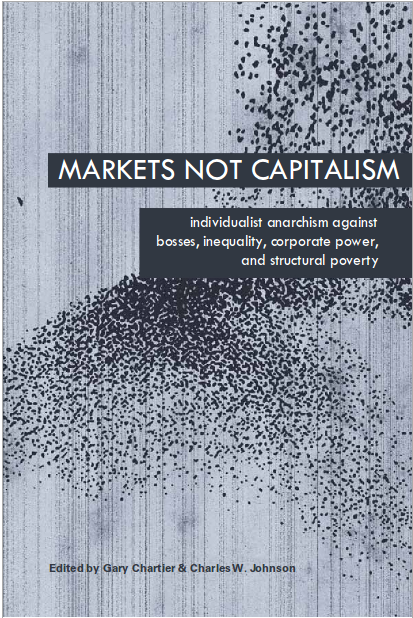We Will: The Radical Possibilities of Freed-Market Social Activism
One of the Five Pillars
of left-wing market anarchism that Gary Chartier and I identify in the Introduction to Markets Not Capitalism is a commitment to the radical possibilities of market social activism:
. . . [M]arket anarchists also see freed markets as a space not only for profit-driven commerce, but also as spaces for social experimentation and hard-driving grassroots activism. They envision "market forces" as including not only the pursuit of narrowly financial gain or maximizing returns to investors, but also the appeal of solidarity, mutuality and sustainability. "Market processes" can — and ought to — include conscious, coordinated efforts to raise consciousness, change economic behavior, and address issues of economic equality and social justice through nonviolent direct action.
— Introduction. 3.
Markets Not Capitalism (Autonomedia/Minor Compositions, 2011).
Here’s some more on that, thanks to the kind efforts of DFW Alliance of the Libertarian Left. This is some broad orientation on what it means and why it matters. The specifics I’ve talked about for quite a while here; it was also the topic of my recent talk at Libertopia. More on that soon, I hope. But for now: This clip is excerpted from a much longer interview with Jason Lee Byas and Grayson English at Liberty Minded / Speaking on Liberty. (Thanks, y’ALL!)
Transcript included below for folks with screen readers, et cetera.
Grayson English: I think it’s all very interesting, all this about thicker commitments, and different things that libertarians tend to ignore, and some of the more ethical concerns that go into these social issues. But I think there’s been a pretty devastating critique on Facebook about how left-libertarianism has nothing to say about ethics, and it’s basically just saying that whatever the market does, is good. I don’t know, I just think that seems somewhat problematic for this philosophy of thicker commitments, and indirect coercion. What do you think of that?
Jason Lee Byas: . . . The great agora that is Facebook, for philosophical symposiums in every thread, yeah …
R.G.: Yeah, I’ve definitely talked with some folks about this, on Facebook and elsewhere. I fear that Facebook is actually, like, systematically the worst possible medium for having involved discussions about this kind of stuff, for various reasons.
But, broadly what I’d say is this: left-libertarianism involves a claim that without state coercion, and without various forms of legal privilege, there are a bunch of forms of social and economic inequality, and social and economic privilege, that would tend to be systematically undermined — that would be much weaker than they are in society as it is. It doesn’t involve a claim that just freeing the market, and seeing whatever will happen, without your intervention, when markets are free, — is what either free-market anticapitalism in particular or what left-libertarianism is all about. That’s not the end of the day for either of those views.
And, so I think it is true, that if you get rid of — and it’s really important not to forget this; this is the reason we stress so much the importance of state monopoly in upholding capitalist privilege, for example — is not to suggest that, in a society freed of government intervention and regulation, that the freed market would automatically solve every social problem, every form of inequality, cancer, tooth decay, and that the seas would become the temperature and flavor of lemonade.
The specific claim is that there’s a bunch of stuff that would tend to sort of systematically get better just in virtue of kicking out the supports from institutions that are actively making it crappier. So there are a lot of forms of privilege that would tend to sort of sink and falter under their own weight, without the ongoing efforts of the state to subsidize them and to burn out competitors. But — whatever forms of social inequality, and whatever social evils — and there’s plenty that would remain, even if in a weaker form — are things that libertarians ought to take a direct hand in organizing nonviolent social confrontation against. Where these things don’t fall under their own weight, we have a responsibility to get together and push them over. And that means a serious commitment to grassroots community organizing and to social activism within the context of this freed market that we’re imagining.
That’s something I’ve always tried to emphasize in my work as very important — if you’re wondering who will stop the rich from running everything in a free society, part of the answer has to be that we will. And there are straightforward ways in which it’s connected with this commitment to the radical possibilities of freed market social activism. That is closely connected with seeing that being in favor of market relationships, is not the same thing as just kicking back and saying,
Well, I don’t have to lift a finger because the market is going to take care of all my problems for me. . . . —Jason Lee Byas:
Market take the wheel!—R.G.: — I mean market forces just are us; they’re people acting rationally in the world. We shouldn’t just be consumers of social conditions, but entrepreneurs of social conditions. That’s going to mean things like mutual aid associations forming up, fighting unions, neighborhood associations. It’s going to mean feminist activism, culture jamming, consciousness-raising, — all kinds of zaps and activism and building counter-institutions that are in the hands of ordinary folks, rather than in the hands of a socially or economically privileged bureaucracy. Any conception that takes market relationships *fully seriously,* is going to have to include social activism as an essential component of a flourishing free society. Not something that we’re bringing market relationships in instead of, because we don’t want to get our hands dirty with that stuff. It’s stuff that can, and should, and almost certainly will be happening in a free market society. And if you don’t see it happening, the solution is to be the change — to be the one that makes it happen.
Discussion from DFW ALL here. Full interview here. Speaking on Liberty interview series here.





